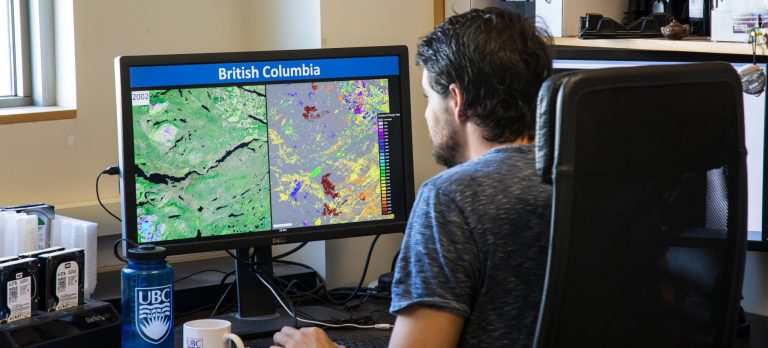
Over the years, Forestry has had to fight back against unreasonable negativity. But for all the naysayers and environmental pessimists, a little research will reveal that modern forestry is about much more than most people realize.
At the University of British Columbia (UBC), one of the world’s foremost public universities, it is possible to study many different facets of modern forestry, from conservation to wood products to genomics, allowing students around the world to really make a difference to some of the most prominent threats currently facing humanity
Set in beautiful Vancouver, rated as one of the most desirable places in the world to live, UBC’s backdrop of sea, forests and snow-capped mountains demonstrates why the Faculty of Forestry is the ideal place to embark on a career that could make a significant change to our world.
The Faculty of Forestry presents a number of possibilities, and they very much depend on where your interests lie. The degree in Forest Sciences enables you to examine the complex wonders of forest ecosystems, starting you off on a career as a forest scientist. The program can be tailored to your specific interests, whether it be in laboratory-based studies of advanced genomics or out in the forest, or otherwise studying aspects of the forest like its soil, wildlife, climate or protection. This is becoming an increasingly important area as climate change leads to more and more problems, such as forest fires and global pest outbreaks.
For those more interested in the management of forests, the degree in Forest Resources Management offers several specializations. The most popular is Forest Management, where students learn techniques that can be used to ensure the long-term sustainability of the world’s forests. The forest operations specialization equips you with both the forestry and engineering skills needed to work in the important area of forest harvesting: you’ll learn how to blend the economic, ecological and social requirements associated with the wise use of our forests. The Aboriginal and community forestry specialization provides the emphasis on the social skills needed to work with people in community-managed forests.

With an increasing proportion of the world’s population living in cities, the need for green spaces has become increasingly apparent. In UBC’s Urban Forestry program, you not only learn how important these green spaces are and the difficulties associated with managing them; you’ll also learn about the environmental challenges facing cities, and how they can adapt to combat these problems. New evidence is showing just how meticulously the well-being of urban populations depends on their access to green space- so why not become a part of this critically important area!
With global losses in biodiversity becoming ever prominent, understanding how to suitably manage the world’s natural resources has become increasingly important, and this can be achieved through the Natural Resources Conservation program. This program offers two options; one focusing more on British Columbia, the other with a more global perspective. Here, you can learn about the sustainable management of resources, about protecting endangered species, about balancing economic development and conservation, and many other fascinating areas. Completion of this program prepares you for a wide range of careers in ecology, environmental science, wildlife management, fisheries and a range of other exciting possibilities.
Wood is increasingly recognized as one of the most sustainable materials we have readily available, and the range of products being incorporated into grows steadily day-by-day. It is a complex material, and understanding its properties and potential is a major part of the Wood Products Processing program This award-winning program was designed to prepare students for a career in the wood products sector, providing state-of-the-art knowledge in processing, manufacturing, marketing and every other aspect associated with working in the industry. Graduates from this program are not only in high demand, but also command high salaries on a global scale.

So what makes these programs different to those on offer elsewhere? Firstly, experiential learning is a key part of each program; you’ll spend time in the forest, in other ecosystems or in industrial settings seeing for yourself what you have learned about in the classroom. Field camps are held in both of the university’s research forests, one in British Columbia’s globally significant coastal temperate rainforest, and the other in an interior forest more characteristic of wider Canada’s forest areas.
The co-op option is strongly encouraged, enabling you to gain practical experience throughout your degree, greatly increasing your chance of success when it comes to seeking your dream job. Many students opt to take a minor in Commerce, provided by UBC’s world-class Sauder School of Business, giving students the business skills needed if they want to start their own business or fast-track through an existing company’s management hierarchy.
Taking a degree program in UBC Forestry is not just an opportunity to obtain a post-secondary qualification; it’s an opportunity to set you off on a career that could have global impact. What’s more, not only can you do this at one of the globe’s top universities, but you also get to do just this in the heart of British Columbia – one of world’s most breathtaking regions.
Follow the University of British Columbia’s Faculty of Forestry on Facebook, Twitter, YouTube and LinkedIn
All images courtesy of the University of British Columbia’s Faculty of Forestry
Liked this? Then you’ll love these…
Why Study Sustainability and Environmental Sciences
Global leaders in Sustainability, Agriculture and Environmental Sciences







